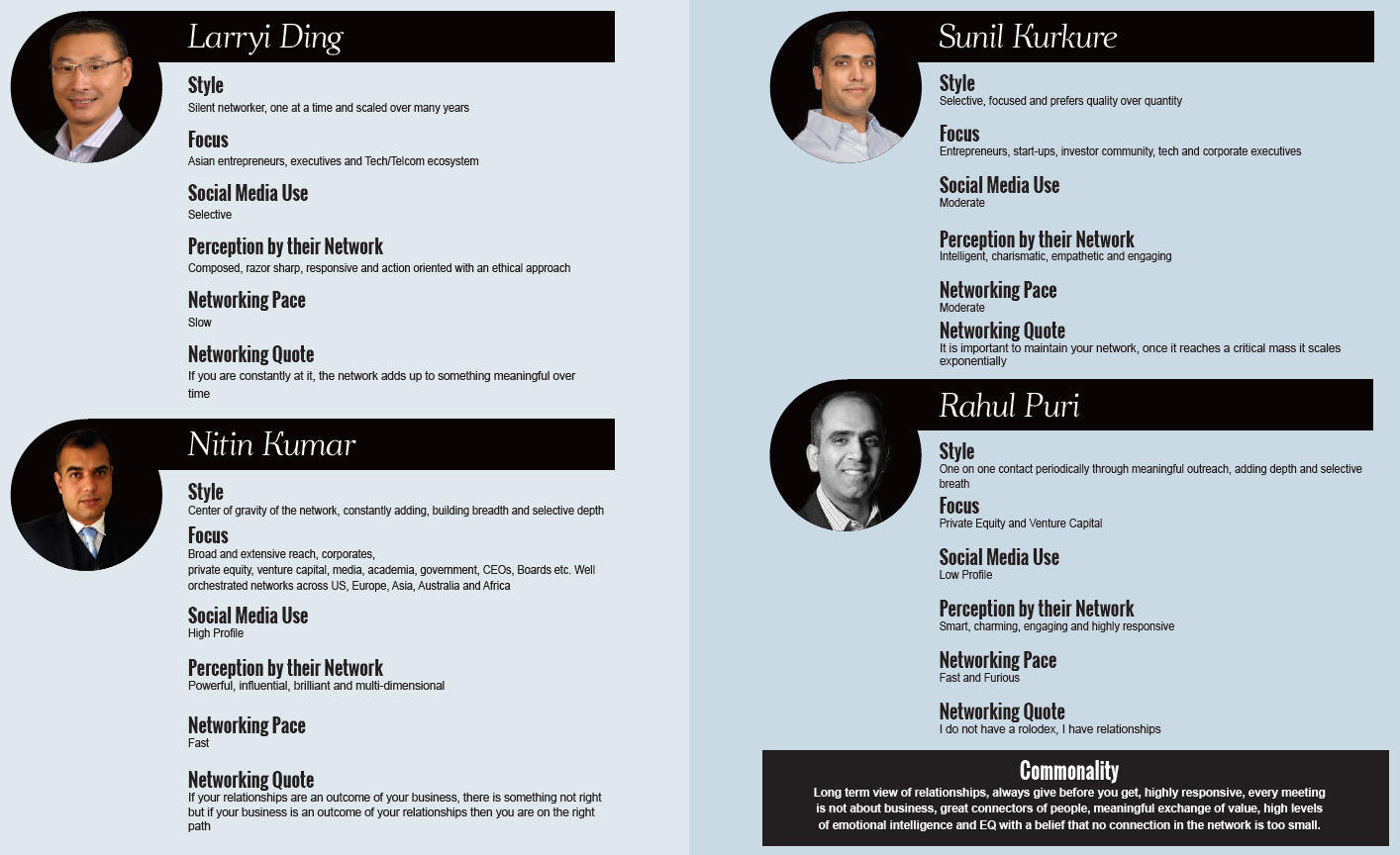We have heard these things many times: “it is all about the network” and “who you know matters more than what you know.” In today’s professional world, networking is the most important skill. People who can develop, scale, maintain and leverage a meaningful network are in short supply.
Whether you are in sales, consulting, or marketing; a C-level Executive or a digital marketer – genuine relationships always pay off. We are featuring Silicon Valley’s Magnificent Four, the most connected professionals in the industry today.
Following from Meet Silicon Valley’s Magnificent Four, these elites from the industry share further insight into their networks and the overwhelming skill and success behind them:
How have you built your extensive network into what it is today?
Larryi Ding: By making one genuine connection at a time, over many years, the network adds up to a meaningful size. It needs to be thought of as a human ecosystem you can rely on to exchange value. Trust and interaction are the most important building blocks. Plant the seeds first, start with a small core of people you have things in common with, then strengthen the core from there to expand it.
Nitin Kumar: It came more naturally to me, and took me many years to realise that I already had a deep and wide network from having lived and worked in many different places and fields. The rest is all about connecting, creating value, executing and maintaining the network. I just like making new connections in different walks of life - it is enriching personally and professionally.
Sunil Kurkure: I have found that taking a genuine interest in people and understanding them lays the foundation for a meaningful and lasting relationship. Trust is a key component of scaling your network. The people you connect with need to feel that you have integrity and that you are willing to help them.
Rahul Puri: It takes time, energy and patience as great networks are not built in a day. Constant, meaningful reach-outs and ensuring you are not always selling or trying to get something out of people is critical to building trust: connect with people, help them with genuine intent and always keep in touch in a meaningful manner.
What would you say are the most important skills of a great networker?
Larryi Ding: Every meeting needs to exchange value. When you meet people, try to exchange ideas, share insights or show them what they do not normally see and people will gravitate to you.
Nitin Kumar: Connect with genuine intent, not with a motive. In any relationship, you have to give before you get and build that trust as the genuine advocate. Stay engaged through outreach and demonstrate the value you could create together.
Sunil Kurkure: There are three important skills that great networkers possess: the ability to have a conversation that is relevant to both parties, the willingness to open your network to help others and the desire to add value.
Rahul Puri: Do not look for an instant outcome or try to orchestrate the meeting, think of what they need rather than what you want. Being responsive to people and following up is very important to build trust and genuine connections.

What do people need to make it in Silicon Valley and broader Hi-Tech sector networks?
Larryi Ding: There are lots of smart people out there: do not try to outsmart others. You could still grow your network through unique value propositions, connecting with other well-networked individuals or trying to learn and understand the next big thing. Generating ideas is important, but people want to hear insights and solutions to problems.
Nitin Kumar: Understand the latest trends, ideas, insights, emerging companies, deal flow, technology, business model, capital sources, career opportunities and ecosystems. Chances are that your network is always in need of one or more of the above. The network plays a very important role in amplifying your brand and bringing in value to enhance what you already have. This is all easier said than done and takes a long time, but it has worked for me and many others.
Sunil Kurkure: Silicon Valley is full of different communities – engineers, investors, executives and entrepreneurs to name a few. You need to connect with all of these communities on a regular basis and across multiple fronts by solving problems, generating new ideas, and identifying trends.
Rahul Puri: In the Silicon Valley, a network is a very important thing. In this business, you are constantly networking for improving ideas, for raising capital, for growing the business and to exit a business. All of this is impossible without a strong network. Although “making it” is a relative term, making the network work is more like it and with the right attitude, the right skills and the right network, it is certain that you will make it.
Can you tell us more about your own style of networking? What makes you so successful?
Larryi Ding: I am not a “networking ninja” - it is more silent and one at a time for me. A network is an outcome of the positive impact you have on others. However small, it attracts people to you. It is important to think of relationships as long term, show genuine intent and care, and make it personal as it is not always business. Even opponents and competitors are people and you can win them over.
Sunil Kurkure: I think it helps to be genuinely curious about people, their work, their families and what matters to them. I try to spend more time listening than speaking in meetings. I look for common interests and spend time with my network in areas that are not related to business.
Nitin Kumar: It has all been about putting people together to create more value. I do not stick to one niche network in a place, industry or focus – the breadth has been an important factor for this. I do this by connecting on social media, providing insights there and in real life, and solving problems of capital, knowledge or network by making connections for people through organizing events and one-on-one outreaches.
Rahul Puri: I am out there at the right events and conferences, and am not shy to reach out to people. The key is to have enough background on them to make it personal and genuine, know their business and have insights into it. This is what I strive for, as business is always important, but it’s not the end goal. Know them as people. Over the years, I have made notes to ensure I remember small things about them so that I know when major milestones are reached.
Once a solid network is built, how do you keep it strong over time? What are the risks that might weaken it?
Larryi Ding: Reputation and credibility is the social currency today: invest in it and nurture it and it will be your biggest strength. If this gets tarnished, your network will erode quickly. By being ethical, genuine, action-oriented and fulfilling your promises, the network will grow itself.
Nitin Kumar: Continuously add to your network with different types of people, as it is not just about connecting to CEOs and Boards all the time. Solve people’s problems through your professional skills or through the network. I agree with reputation being the social currency, responsiveness and actions can help solidify this, and having toxic individuals in your network can quickly contaminate it. Be wise and focus on where you spend your time.
Sunil Kurkure: This is the hardest thing to do. It takes discipline. You need to balance your time to maintain the existing connections across your network and find time to build new relationships. I try to meet on average 2-3 new people every week. Be protective of your network. Maintain a reputation of high integrity and credibility, so that you can continue to attract those who have similar values.
Rahul Puri: This is the difficult part: as the network grows, it gets harder to keep it current. Leveraging technology like personal CRMs, following internet updates, setting up alerts and manually looking up folks you have not connected with in a while are techniques you can use to stay atop. Certain relationships weaken over time and people move on, but keep adding new people to exchange value with.











